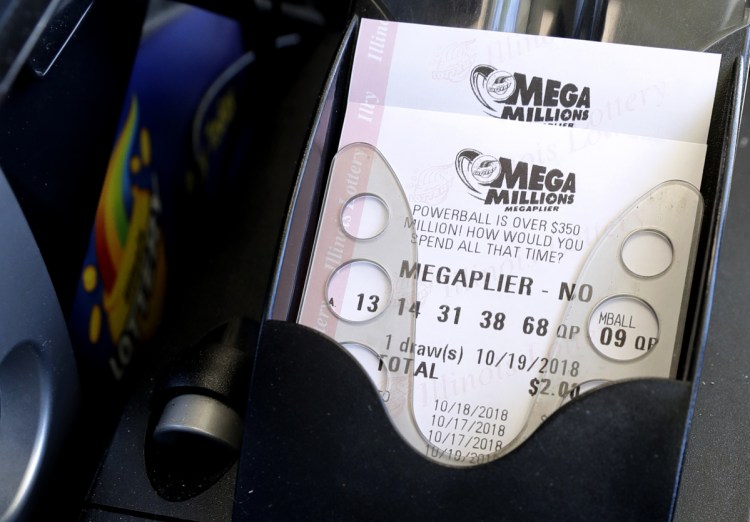DES MOINES, Iowa – If it seems like lottery jackpots are getting larger and larger, it’s because they are getting larger and larger.
Friday night’s Mega Millions estimated grand prize hit a staggering $1 billion, continuing a trend of giant jackpots. It was the second-largest lottery prize in U.S. history and joined five other top 10 drawings in the last three years.
The winning numbers, announced just after 11 p.m., are 15 23 53 65 70 and Mega Ball 7.
Lottery officials changed the odds in recent years to lessen the chance of winning a jackpot, which in turn increased the opportunity for top prizes to reach stratospheric levels. A look at how the numbers work out:
WHY REDUCE THE NUMBER OF JACKPOTS?
The theory was that bigger jackpots would draw more attention, leading more players to plop down $2 for a Mega Millions or Powerball ticket. The more tickets sold, the more the jackpots grow, leading to more players and … you get the idea.
Powerball was the first to try the theory, in October 2015, when it changed the potential number combinations. In doing so, Powerball changed the odds of winning the jackpot from one in 175 million to one in 292.2 million. Officials at that time also increased the chances of winning small prizes. Mega Millions made similar moves in October 2017, lengthening the odds from one in 259 million to one in 302.5 million
DID IT WORK?
States have generally reported increased Mega Millions and Powerball sales since the change. But the ever-increasing jackpots have left them ever-more dependent on those massive payouts because prizes that once seemed so immense now seem almost puny in comparison. Consider the current $430 million Powerball jackpot. That’s an incredible amount of money, but compared to the Mega Millions prize hovering around $1 billion, it barely seems worth the bother of buying a ticket.
WHEN THE JACKPOT GETS ENORMOUS, WHAT ARE SALES LIKE?
It’s hard to overstate how fast lottery tickets fly out of the mini marts when the top prizes get so large. In California, for example, the lottery Thursday sold $5.7 million in Mega Millions tickets during the first half of the day. The height of sales came during the lunch hour, when people were buying 200 tickets per second.
Mainers turned out in droves Friday in hopes of winning the jackpot.
Maine had sold $713,000 of the $2 and $3 tickets by 4:30 p.m. Friday, said Michael Boardman of Maine State Lottery. He expected Maine sales to exceed $1 million before the last ticket was sold at 9:50 p.m.
In a typical week, Maine sells about $273,000 worth of Mega Millions tickets, Boardman said.
Sales got brisker as the deadline edged closer, he said – between 3 and 4 p.m., Mainers were spending about $1,900 a minute buying $2 and $3 Mega Millions lottery tickets.
IF I WIN, WHAT MAKES IT INTO THE BANK?
Don’t count on making a deposit for anywhere close to $1 billion if you win the Friday night drawing. Nearly all winners take the cash option, which was about $548 million as of Friday morning. After federal taxes and state deductions, which vary across the country, winners will generally end up with around half that amount to pay for their yacht shopping. The annuity option guarantees more money, but it’s paid over 29 years and also would result in a hefty tax bill.
GIVEN THE AWFUL ODDS, AM I A SUCKER TO PLAY?
You’re not being rational if you think you have a good chance of winning the jackpot, whether it’s with one ticket or 100. The probabilities are overwhelmingly not in your favor.
Most people don’t expect to win and instead think the $2 ticket is a small price to dream and be part of a wishful conversation with co-workers or family. As Jane L. Risen, a professor of behavioral science at the University of Chicago, puts it: When the jackpot grows so large, “it creates this sense of community. It creates this sense of camaraderie. I also think that it creates a potential sense of regret to not be the one playing,” she said.
Associated Press journalist Teresa Crawford in Chicago contributed to this report.
Press Herald Staff Writer Penelope Overton contributed to this report.
Send questions/comments to the editors.



Success. Please wait for the page to reload. If the page does not reload within 5 seconds, please refresh the page.
Enter your email and password to access comments.
Hi, to comment on stories you must . This profile is in addition to your subscription and website login.
Already have a commenting profile? .
Invalid username/password.
Please check your email to confirm and complete your registration.
Only subscribers are eligible to post comments. Please subscribe or login first for digital access. Here’s why.
Use the form below to reset your password. When you've submitted your account email, we will send an email with a reset code.